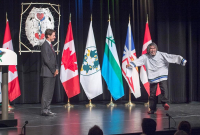Support strong Canadian climate journalism for 2025
The Trudeau Liberals are wading carefully into a national dialogue on combating racism and discrimination to ensure a national plan focuses on solutions, instead of sparking a contentious debate that could thwart federal efforts.
The Liberals will soon launch small-scale consultations on a national anti-racism strategy promised in February's budget.
Canadian Heritage Minister Melanie Joly, who will oversee the work, said the government wants to "find real solutions to real problems," particularly on fundamental rights and access to justice and jobs.
Joly said the government won't run broad consultations on racism, opting instead to speak with different stakeholders about spending on programs outlined in the budget.
Previous efforts to talk about racism have not gone well.
Concerns about free speech forced their way into discussions around a Liberal MP's motion condemning Islamophobia. Similarly, the Quebec government's plan to consult on systemic racism was met with objections that forced the province to tone down its plans.
The Liberals are now looking to avoid the same pitfalls.
Liberal MP Greg Fergus, chair of the parliamentary black caucus, said federal consultations must ensure debate doesn't devolve into accusations of racism, but rather examine how discrimination manifests itself.
"Systemic racism exists in Canada," Fergus said in French after a Liberal caucus meeting.
"We're much better than other societies around the world but ... we still have our flaws."
A recent House of Commons committee study on combating Islamophobia and systemic discrimination and racism recommended the government craft a national anti-racism strategy — which will happen as part of $23 million in spending over two years for multiculturalism programs.
The committee also pushed the government to do a better job of collecting and analyzing data on diversity and inclusion, which Statistics Canada received $6.7 million to do over five years.
NDP Leader Jagmeet Singh said he wanted the government to take actions like reforming the justice system — noting the disproportionate number of black and Indigenous Peoples in Canada's prisons — and improve access to education for marginalized communities.
"It's not a problem to study, but it's a problem if you only study all the time, but don't have actions," Singh told reporters in French.
"We want the government to act."
Wednesday marked the International Day for the Elimination of Racial Discrimination, which the United Nations decreed in 1966 should fall every year on March 21, the anniversary of a deadly 1960 crackdown on an anti-apartheid rally in South Africa.
A survey released by the Association of Canadian Studies to coincide with the day suggests concerns remain about racism in Canada.
About half of respondents in an online web panel said they believed racism was a serious problem in their province.
The results also suggest respondents who have more contact with different minority communities tended to have more favourable views towards those communities — a finding especially true for younger respondents, said Jack Jedwab, the association's president.
The survey also offers insight into how non-Indigenous Canadians view their role in efforts to foster reconciliation with Indigenous Peoples and accept responsibility for historic injustices.
Asked whether "all Canadians" should share responsibility for past wrongs like the residential school system, 48.5 per cent of respondents said they either somewhat or strongly agreed with the premise — similar levels to last year.
Newcomers and children of immigrants who were part of the survey were more likely to see reconciliation with Indigenous Peoples as a collective issue for the country to address, perhaps as a result of an emphasis on Indigenous history in Canada's citizenship guide.
About four out of every five respondents to the survey said they consider themselves to have a good grasp of Canadian history. Asked for reasons why they might not be not proud of that history, 30 per cent of responses were about the treatment of Indigenous Peoples, and eight per cent about residential schools.
As well, just over half of respondents expressed interest in having a dialogue with Indigenous Peoples about reconciliation.
The online survey, conducted by Leger Marketing, sampled 2,344 people on a web panel between Nov. 14 and 21 last year.
The polling industry's professional body, the Marketing Research and Intelligence Association, says online surveys cannot be assigned a margin of error as they are not random and therefore are not necessarily representative of the whole population.





Comments
Their priorities are completed screwed.... https://canadianviews-ymo.ca/canadas-colonial-caretakers/